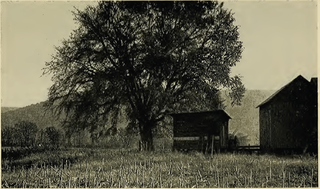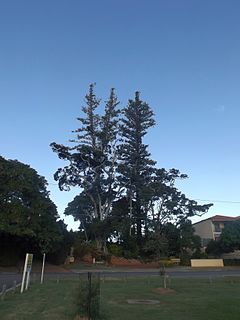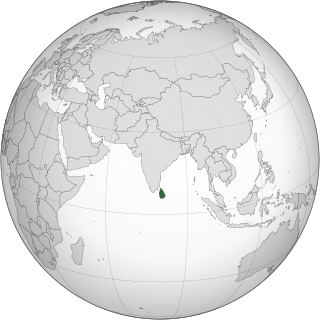
Squatting is the action of occupying an abandoned or unoccupied area of land or a building, usually residential, that the squatter does not own, rent or otherwise have lawful permission to use. The United Nations estimated in 2003 that there were one billion slum residents and squatters globally. Squatting occurs worldwide and tends to occur when people who are poor and homeless find empty buildings or land to occupy for housing. It has a long history, broken down by country below.

Corydon is a town in Harrison Township, Harrison County, Indiana. Located north of the Ohio River in the extreme southern part of the U.S. state of Indiana, it is the seat of government for Harrison County. Corydon was founded in 1808 and served as the capital of the Indiana Territory from 1813 to 1816. It was the site of Indiana's first constitutional convention, which was held June 10–29, 1816. Forty-three convened to consider statehood for Indiana and drafted its first state constitution. Under Article XI, Section 11, of the Indiana 1816 constitution, Corydon was designated as the capital of the state until 1825, when the seat of state government was moved to Indianapolis. During the American Civil War, Corydon was the site of the Battle of Corydon, the only official pitched battle waged in Indiana during the war. More recently, the town's numerous historic sites have helped it become a tourist destination. A portion of its downtown area is listed in the National Register of Historic Places as the Corydon Historic District. As of the 2010 census, Corydon had a population of 3,122.

The Aroostook War, or the Madawaska War, was a military and civilian-involved confrontation in 1838–1839 between the United States and the United Kingdom over the international boundary between the British colony of New Brunswick and the U.S. state of Maine. The term "war" was rhetorical; local militia units were called out but never engaged in actual combat. The event is best described as an international incident.
The Penobscot are an Indigenous people in North America from the Northeastern Woodlands region. They are organized as a federally recognized tribe in Maine and as a First Nations band government in the Atlantic provinces and Quebec.

The Federal Writers' Project (FWP) was a federal government project in the United States created to provide jobs for out-of-work writers during the Great Depression. It was part of the Works Progress Administration (WPA), a New Deal program. It was one of a group of New Deal arts programs known collectively as Federal Project Number One or Federal One. The FWP employed thousands of people and produced hundreds of publications, including state guides, city guides, local histories, oral histories, ethnographies, and children's books. In addition to writers, the project provided jobs to unemployed librarians, clerks, researchers, editors, and historians.

Charles Bulfinch was an early American architect, and has been regarded by many as the first native-born American to practice architecture as a profession.

The Republic of Madawaska was a putative republic in the northwest corner of Madawaska County, New Brunswick and adjacent areas of Aroostook County in the US state of Maine and of Quebec. The word "Madawaska" comes from the Miꞌkmaq words madawas (porcupine) and kak (place). Thus, the Madawaska is "the country of the porcupine". The Madawaska River which flows into the Saint John River at Edmundston, New Brunswick, and Madawaska, Maine, flows through the region.

The Mussel Slough Tragedy was a dispute over land titles between settlers and the Southern Pacific Railroad (SP) that took place on May 11, 1880, on a farm located 5.6 miles (9 km) northwest of Hanford, California, in the central San Joaquin Valley, leaving seven people dead. Frank Norris' 1901 novel, The Octopus: A Story of California, was inspired by this incident, as was W. C. Morrow's 1882 novel Blood-Money. May Merrill Miller's novel, First the Blade, includes a fictionalized account of the conflict. The exact history of the incident has been the source of some disagreement, largely because popular anti-railroad sentiment in the 1880s interpreted the incident as a clear example of corrupt and cold-blooded corporate greed. Muckraking journalists and anti-railroad activists glorified the settlers and used the events as evidence and justification for their anti-corporate crusades. The site of the episode is now registered as California Historical Landmark #245. A historical marker on the east side of 14th Avenue, 350 yards north of Elder Avenue, memorializes the site.

The Fair Play Men were illegal settlers (squatters) who established their own system of self-rule from 1773 to 1785 in the West Branch Susquehanna River valley of Pennsylvania in what is now the United States. Because they settled in territory claimed by Native Americans, they had no recourse to the Pennsylvania colonial government. Accordingly they established what was known as the Fair Play System, with three elected commissioners who ruled on land claims and other issues for the group. In a remarkable coincidence, the Fair Play Men made their own declaration of independence from Britain on July 4, 1776 beneath the "Tiadaghton Elm" on the banks of Pine Creek.

Squirrel Island, Maine is an island in the Gulf of Maine and village within the town of Southport, Maine. It was established as a summer community in 1871. The origin of the name is not related to its squirrel population, since according to island chronicler Charles McLane "[s]quirrels do not inhabit the island ," but, rather, refers to the shape of the island which, when seen from above, resembles a squirrel holding an acorn.

The history of Omaha, Nebraska, began before the settlement of the city, with speculators from neighboring Council Bluffs, Iowa staking land across the Missouri River illegally as early as the 1840s. When it was legal to claim land in Indian Country, William D. Brown was operating the Lone Tree Ferry to bring settlers from Council Bluffs to Omaha. A treaty with the Omaha Tribe allowed the creation of the Nebraska Territory, and Omaha City was founded on July 4, 1854. With early settlement came claim jumpers and squatters, and the formation of a vigilante law group called the Omaha Claim Club, which was one of many claim clubs across the Midwest. During this period many of the city's founding fathers received lots in Scriptown, which was made possible by the actions of the Omaha Claim Club. The club's violent actions were challenged successfully in a case ultimately decided by the U.S. Supreme Court, Baker v. Morton, which led to the end of the organization.
The Reno Gang, also known as the Reno Brothers Gang and The Jackson Thieves, were a group of criminals that operated in the Midwestern United States during and just after the American Civil War. Though short-lived, they carried out the first three peacetime train robberies in U.S. history. Most of the stolen money was never recovered.
Andrew Thompson Judson was a United States Representative from Connecticut and a United States District Judge of the United States District Court for the District of Connecticut.

Tocowa is a ghost town located just outside Batesville in Panola County, Mississippi, United States.
The Squatters' riot was an uprising and conflict that took place between squatting settlers and the government of Sacramento, California in August 1850 concerning the lands that John Sutter controlled in the region and the extremely high prices that speculators set for land that they had acquired from Sutter. The influx of squatters was a consequence of the 1848 California Gold Rush; when courts began to take legal action against squatters in the area, the squatters mobilized under Dr. Charles L. Robinson and Joseph Maloney and challenged mayor Hardin Bigelow and sheriff Joseph McKinney; the conflict was ultimately resolved, and the speculation in Sacramento ended as a result.
Squatting in the United States is the unauthorized use of real estate. Historically, squatting occurred during the California Gold Rush and when colonial European settlers established land rights. There was squatting during the Great Depression in Hoovervilles and also during World War II. Shanty towns returned to the US after the Great Recession of 2007 to 2009 and in the 2010s, there have been increasing numbers of people squatting foreclosed homes using fraudulent documents. In some cases, a squatter may be able to obtain ownership of property through adverse possession.

Wiscasset is a town in and the seat of Lincoln County, Maine, United States. The municipality is located in the state of Maine's Mid Coast region. The population was 3,742 as of the 2020 census. Home to the Chewonki Foundation, Wiscasset is a tourist destination noted for early architecture.

The Norfolk Island Pine Trees are a heritage-listed group of trees at 127 Shore Street North, Cleveland, City of Redland, Queensland, Australia. They were added to the Queensland Heritage Register on 21 November 2003.
Squatters' Action for Secure Homes (SQUASH) is an activist group formed first in the 1990s in the United Kingdom to represent the interests of squatters and to fight the proposed criminalisation of squatting. It then reformed in 2011, when there were again parliamentary discussions about making squatting illegal. After squatting was (partially) criminalised in 2012, the group continues to monitor arrests and convictions.

Squatting in Sri Lanka occurs when people are displaced by war or natural disasters, find it difficult to transfer title or build shanty towns. The Government of Sri Lanka has attempted to regularize squatter settlements. In 2020, there were reported to be over 600,000 squatters on state land.














